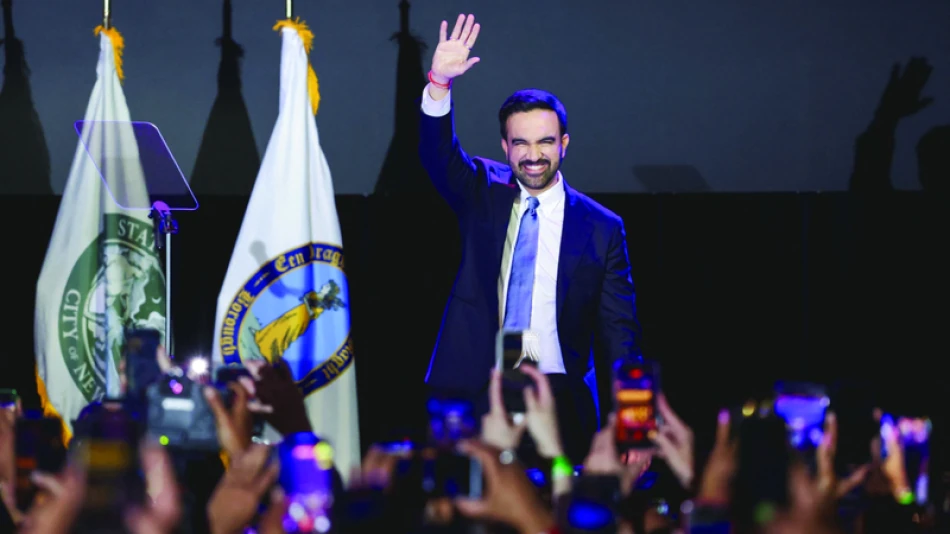
Ummadani's Victory Deals a Blow to Traditional Democratic Party Strategies
Zahran Mamdani, a 34-year-old socialist politician, just delivered a stunning blow to billionaire influence in American politics by winning New York City's mayoral race. Despite facing millions in opposition funding from wealthy donors, Mamdani beat his billionaire-backed opponent by nine points with a message focused on social justice and affordable living.
The victory represents more than just a local election win. It challenges the power of big money in politics that's dominated American campaigns since the 2010 Citizens United decision opened the floodgates for unlimited corporate spending. Mamdani's opponent, former New York Governor Andrew Cuomo, ran as an independent after losing to Mamdani in the Democratic primary. Even with massive financial backing, Cuomo couldn't overcome the young socialist's grassroots appeal.
The money flowing against Mamdani was staggering. Billionaire investor Bill Ackman, a Trump supporter, contributed $1.75 million to Cuomo's campaign. A former New York mayor donated $8.3 million. The Lauder family from the cosmetics industry put $2.6 million into anti-Mamdani organizations, while the wealthy Tisch family added another $1.2 million trying to stop the socialist candidate.
These donors were clearly worried about Mamdani's bold policy proposals. He's called for expanding social services and comprehensive childcare, and famously stated that "there shouldn't be billionaires." His unapologetic socialist stance terrified the wealthy elite who usually get their way in American politics.
But here's what makes this interesting - the money didn't work. New York voters chose Mamdani's authentic message over the slick, well-funded opposition campaign. This shows that even in America's most expensive media market, grassroots organizing can still beat big money.
The win comes at a crucial time for the Democratic Party, which has been struggling with identity and direction since losing to Trump in 2024. Many Democratic leaders have been pushing what some call "moderate populism" - essentially moving right to appeal to the center. This approach has created a network of centrist think tanks and consultants more focused on pleasing wealthy donors than representing working people.
Mamdani rejected this entirely. Instead of moderating his positions or polishing his image, he ran on an honest platform addressing economic inequality in New York. When opponents launched racist attacks portraying him as a "Ugandan Muslim who celebrates terrorism," he didn't respond with anger but kept campaigning with calm confidence.
When critics tried to scare voters about his socialism, Mamdani reminded them of Vito Marcantonio, a socialist who represented Harlem in Congress for seven terms. "We need to look at our past to see how socialism can create a bright future," he said. This message resonated with New Yorkers who gave him overwhelming support.
The response from Democratic leadership was telling. House Democratic leader Hakeem Jeffries avoided clearly endorsing Mamdani, even though his own district voted heavily for the socialist candidate. Senate Minority Leader Chuck Schumer refused to say who he supported, leading to speculation he may have voted for Cuomo. Former President Barack Obama did call to congratulate Mamdani and praise his campaign.
This lukewarm response from party leaders reveals something deeper than policy disagreements. The Democratic establishment seems genuinely worried about what Mamdani represents. He won with an honest, principled message at a time when American politics is dominated by money, polls, and special interests.
What Democratic leaders might fear most isn't that Mamdani will fail as mayor, but that he'll succeed. His success would prove that progressive socialism can work in America's largest city, challenging everything the party's moderate wing believes about electability and messaging.
Mamdani's victory suggests reports of the Democratic Party's death have been greatly exaggerated. But it also shows the real energy and future of the party might come from outside traditional power circles - from young politicians who believe in people more than they believe in money and influence. His win proves that authentic progressive politics can still triumph over billionaire-funded opposition, even in the most expensive political battlegrounds.
Most Viewed News

 Sara Khaled
Sara Khaled






